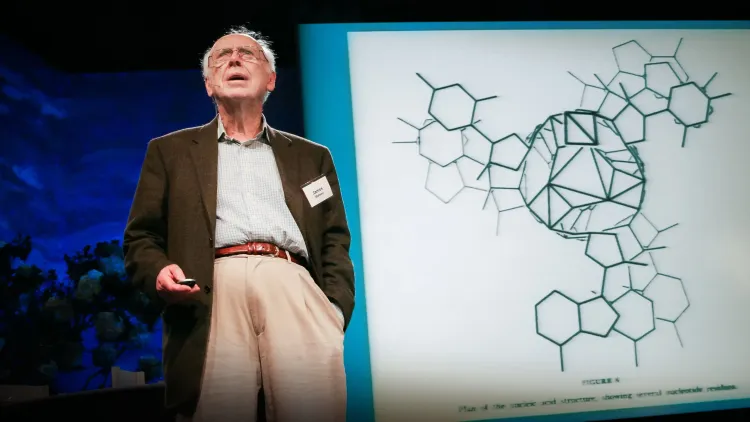Did Nobel Prize Co-winner James Watson Consider DNA His Only Gold Rush?

Synopsis
Key Takeaways
- James Watson played a crucial role in uncovering the structure of DNA.
- He was awarded the Nobel Prize in Physiology and Medicine in 1962.
- Watson's legacy is complicated by his controversial remarks.
- He transformed Cold Spring Harbor Laboratory into a premier research institution.
- Watson viewed DNA as a significant treasure in scientific research.
New Delhi, Nov 8 (NationPress) "We have unveiled the enigma of existence," proclaimed American scientist James Watson in 1962, alongside Maurice Wilkins and Francis Crick, as they collectively received the Nobel Prize in Physiology and Medicine for their groundbreaking discovery of the double helix structure of DNA.
The renowned geneticist Watson, who passed away at the age of 97, as confirmed by Cold Spring Harbor Laboratory in the US—where he dedicated decades of research—was pivotal in one of the most significant scientific advancements of the 20th century.
While DNA was first identified in 1869, it wasn't until 1943 that scientists established it as the genetic material within cells.
As it stands, the complete structure of DNA is still partially elusive.
Watson died on Thursday (US time) following a short illness, as reported by his former employer.
“From the beginning, I aspired to make a meaningful impact with my life. My focus has always been on science," Watson shared with CNN in 2013.
Driven by a quest for truth, that’s the legacy I cherish. Truth can be complex and sometimes elusive, but starting from a foundation of truth is invaluable, he remarked.
Born in Chicago, Illinois in April 1928, he earned a scholarship to attend the University of Chicago at just 15. He later traveled to Cambridge University in England to further his studies on DNA, where he met Crick.
Together, they embarked on creating large-scale models of possible DNA structures.
Reports indicate that Watson took the helm of Cold Spring Harbor Laboratory in New York State in 1968, transforming it into one of the globe's leading scientific research facilities.
However, his remarkable contributions were overshadowed by his controversial remarks deemed racist and homophobic regarding various communities, which asserted they had genetic disparities.
Such statements resulted in the loss of several honorary titles. Additionally, Watson gained media attention when he auctioned his Nobel Prize in 2014 for a staggering $4.76 million.
Watson expressed to CNN in 2013: “DNA represented my only gold rush. I viewed DNA as a treasure worth pursuing.”









